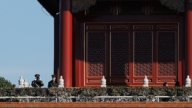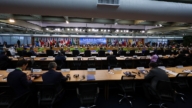【新唐人2012年5月13日讯】广东省委书记汪洋发表“破除人民幸福是党恩赐”的言论后,日前又提出要在广东试点推行“官员财产申报制度”,再次触动中共政改的敏感地带。外界认为,在中共体制内叫政改,恐怕难有真正成效。相反,作为团派人物的汪洋在十八大前频发惊人言论,看上去更像是党内激烈角斗大戏中的一部分,传达出血债派大势已去,改革派将全面主导十八大的信号。
广东省委书记汪洋日前在广东11届党代会上的报告里提出,广东将试点领导干部财产申报公开制度。报告还说,“领导干部财产申报后,要在一定范围内公开,接受人民群众的监督。”
西方民主国家对于官员财产申报制度早就有明文法律规定,也称为“阳光法”。《中国事务》杂志主编伍凡认为,汪洋所提出的官员财产申报有折扣,做不到真正的完全公开。
《中国事务》杂志主编伍凡:“这个监督是谁,这个人民是谁,范围多大,都是非常含糊。你既然是阳光法,就放到媒体上去,让所有人都能看到。在我看来,是在玩文字游戏,在玩猫腻,不是真正我们所认为的世界各国通行的阳光法。所谓阳光法,就是摊开来让所有人都看到,他不是这样的,他在屋子里,阴暗里边让某些人看。”
广东省纪委书记黄先耀5月11号再宣布五条“反腐猛药”,其中包括“禁红包、禁公款吃喝、禁公车私用、强化政治纪律执行情况的监督检查”等。但外界普遍不看好这场由广东发起的高调政改。
香港“动向”杂志主编张伟国:“政府怎么样去解决老百姓实际关注的问题,比如他们的生活啊,比如腐败啊,这样一些问题并不是用一种意识形态,或者是政治口号,或某一两个人的去留就能解决的。如果不解决老百姓现在所关注的,迫切需要解决的问题,中国的政治事实上就是一个僵局,甚至薄熙来事件就可能会是一个导火线,引得整个体制的自我毁灭。”
汪洋5月9号在党代会上声称“我们必须破除人民幸福是党和政府恩赐的错误认识”。伍凡认为,现在已经没有人相信共产党,其实汪洋捅破的只是一层窗户纸。
《中国事务》杂志主编伍凡:“你们不要指望共产党给你幸福。幸福要靠你们自己了。这里面有两个含义了,第一个,尽管我共产党我执政了,我不负责,好坏你们自己负责,在世界各国民主国家不是这样,政府在一定宪法之内,并且是由国会监督,要媒体监督,做不好就要辞职查办,在中国就没有啊。第二点他明明知道老百姓不相信你了,你再怎么讲也没用,所以他(中共)干脆就顺势就下台了。”
“王薄事件”引发中共空前执政危机,有消息说,温家宝曾提出包括直选全国人大代表、废除政法委、实现司法独立等政改方案。但遭遇来自“血债派”周永康和政法委的极力阻挠。如今团派代表人物汪洋突然高唱政改,香港“动向”杂志主编张伟国认为,这证明在十八大之前,薄熙来事件之后,共产党内部权力斗争空前的高涨。
外界分析,改革派有可能在十八大占据主导地位,血债派已经无力回天。
采访/常春 编辑/许旻 后制/李若琳
Wang Yang and Political Reform Suggest Reformers will
Dominate the 18th National Congress
After the talk of “breaking the statement that
people’s happiness is a gift of the CCP”, Wang Yang,
the Secretary of the Guangdong Committee of the Communist
Party of China, has once again touched the sensitive area of
the Chinese Communist political reform by his recent proposal
of a pilot implementation of the “official property declaration system” in Guangdong.
It is speculated that calling political reform within the CCP
system is hardly effective.
On the contrary, Wang Yang’s frequent talk of shocking points
prior to the 18th National Congress is much like part of
the intense inner-party struggle and signals the bloody debt gang
has lost it’s power and the reformers will be leading the 18th National Congress.
During Guangdong’s 11th Party Congress, Party Secretary
Wang Yang reported that
Guangdong will conduct a pilot system for cadres
to publicly declare property.
The report also mentioned, “After the leading cadres declare
their property, it will be available publicly within a certain range to accept supervision by the people."
The official property declaration system, also known as the
“Sunshine Law" with explicit legal provision, has long existed in western democratic countries.
Wu Fan, editor of China Affairs magazine does not believe
the complete openness in Wang Yang’s official property declaration system.
Wu Fan, China Affairs magazine editor: “It is very vague
about who will supervise, who the people are, and what the range is.
Sunshine law should be publicized in the media
so that everyone sees it.
In my opinion, it is playing word games, being tricky,
and is not the real sunshine law as the world knows it.
The so-called sunshine law is open for all to see.
This is not the case. China’s sunshine law is kept inside
the house for certain people to see in the darkness."
Secretary of Guangdong Discipline Inspection Commission,
Huang Xianyao, announced on May 11 five anti-corruption moves,
including “No red envelope, no official funds for eating and
drinking, no private use of official transportation,
strengthen supervision and inspection of political and
disciplinary performance.”
However, this high-profile political reform initiated by
Guangdong province is not fully recognizable…
Zhang Weiguo, editor of Trends magazine from Hong Kong:
“The actual issues of concern for the people are things such as their lives, and corruption.
These questions cannot be resolved by ideology,
political slogans, or by a couple of people.
If these concerns and urgent needs can not be addressed,
China’s politics is in fact in deadlock.
The Bo Xilai incident could be the cause leading to
self-destruction of the whole system."
In the Party Congress on May 9 Wang Yang claimed,
“We must break the misconception that people’s happiness is the gift of the party and government.”
Wu Fan believes that Wang Yang was only tearing a layer
of paper window since no one believes the Communist Party.
China Affairs magazine editor Wu Fan: “Do not expect
the CCP to bring happiness. Happiness relies on your own efforts.
There are two meanings. First, the CCP is in power,
but not responsible. The responsibility is yours.
In a democratic country in the world, the government follows
the Constitution and there is congressional oversight and media monitoring.
If not done well, then resignation and investigation will follow.
It’s not so in China.
Second, the CCP knows that no one believes them.
Any further talk makes no difference.
Therefore, the CCP Will just follows the trend and step down."
The case of Wang and Bo has caused an unprecedented
political crisis for the CCP.
It is said that Wen Jiabao has suggested political reform
such as direct election of the National People’s Congress members,
abolition of the Politics and Law Committee,
and realization of judiciary independence,
but met strong resistance from Zhou Yongkang and also
the Politics and Law Committee of the bloody debts gang.
Now Wang Yang, the leading representative of the Communist
Youth League, is suddenly praising political reform.
Zhang Weiguo, editor of Hong Kong’s Trend magazine
believes this proves the existence of an unprecedented and
intense internal power struggle prior to the 18th National
Congress after the Bo Xilai incident.
It is anticipated that reformers may occupy a dominant
position in the 18th National Congress and that the bloody debts gang will have lost it’s grip.




























